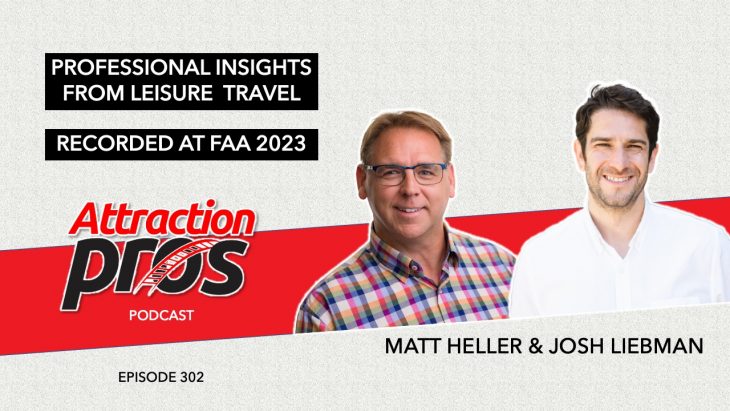
Episode 302: Professional lessons from leisure travel
Podcast: Play in new window | Download
Subscribe: Android | RSS | More
Traveling for leisure can be rejuvenating, relaxing, educational, and an opportunity to disconnect from the real world for a short time. And when you work in the attractions industry, it can also inspire you to come up with new ways to improve your operation back home! Recently, Matt and Josh both traveled internationally and came back with several guest and employee experience examples worth talking about. Even better, they recorded their findings in person at the Florida Attractions Association annual conference in the middle of the networking center. In this episode, Matt and Josh share insights from recent trips to Ireland and Turks and Caicos, respectively.
It takes people to make the dream a reality
“It’s the human beings that are going to determine whether the experience is positive or negative.”
Walt Disney said, “You can design and create, and build the most wonderful place in the world, but it takes people to make the dream a reality.” This quote resonates throughout the attractions industry and any other business where the team members truly deliver the experience. In Josh’s recent experience, he stayed at a Ritz Carlton, whose brand commands a high standard of premium service. With that said, it was the individuals with whom he interacted that made the experience what it was, and a select few truly made the dream a reality. Despite the warm weather, blue skies, sandy beach, and crystal clear waters, the biggest memories from the trip were the team members who went above and beyond.
It takes years – sometimes decades – to make skills appear seamless
“When we are training people to be great service providers, it takes time.”
We expect a lot from our team members, especially when there is a high standard for service and excellence. We also know that we need to train them efficiently so that they are proficient from their first day interacting with guests. True service skills, however, come with time. Matt shares an experience in a Pub in Killarney where the bartender interacted with guests with his authentic personality, which created an enjoyable experience, even though his service could be described as “non-traditional.”
When a guest made an obscure off-menu request, the bartender fully understood what she was asking for and her response was that it was exactly what she wanted. The bartender’s reply was, “I should hope so. I’ve been doing this for 20 years!” Had it been earlier in his career, he may have sought assistance from a coworker or made a drink that did not align with the guest’s request, but after two decades of experience, the unusual request was able to be seamlessly delivered.
The challenge of exceeding expectations is that it raises expectations
“When you have a high guest experience standard in place, you need to keep pushing it forward.”
We all strive to exceed the expectations from our guests. But what happens when our guests get used to us exceeding expectations for them? Josh shares an encounter he had that met the definition of “wow” moment – the staff found a way to do something that most guests wouldn’t expect that would leave a lasting impression. However, Josh expected it based on previous experience at other properties within the brand and even other brands with similar standards.
This is not to say that it wasn’t a positive experience, but it met his expectations for what the brand is known for, rather than go above and beyond. We need to continually think of ways to surprise and delight our guests so that once they pick up on certain patterns, we can push the envelope even further.
A genuine experience can transcend, or exceed, what you know is happening
“I knew that the offer was coming, but I didn’t feel like I was being sold to.”
In the attractions industry, much of the experience is predictable. In a theme park, after you ride a ride, you expect to walk through a gift shop at the end of the experience. On a tour, you expect the guide to present a solicitation for gratuity. However, when the experience is genuine, the feeling of “being sold to” disappears, because it’s a natural part of the experience.
When Matt partook in an experience where he made his own scones and ate them after, the owner said to the group, “If you enjoyed the scones, you can buy the recipe.” In response, guests lined up to buy it. While Matt knew it was coming, he didn’t feel like he was being sold to or manipulated as part of a retail experience. The recipe solicitation was a natural extension of the experience, which was delivered so excellently, Matt felt like his group was the only one in the world who had done it – despite multiple tours running daily.
If we look at it from the lens of the employee experience, if every part of the culture shows that leadership wants them to have the best employee experience, when it comes time to have difficult conversations, they should come across seamlessly, just like the sales opportunity at the end of the guest experience.
Use your knowledge of how guests can have an even better experience
“Sometimes you need to help your guests have the best experience that they can.”
One of the core tenets of guest service is anticipating guests’ needs, which recognizes that guests may not have all the information to have the best experience possible. It Josh’s case, it wasn’t just information, it was talent and skill when he rented a paddleboard in relatively choppy water. After falling several times in a short period of time (providing quality entertainment for everyone on the beach), the guide called Josh back to shore and gave him several tips that he could use to improve his skills. The guide didn’t need to do it; his responsibility including efficient paddleboard rentals and ensuring that all guests were safe – but he saw an opportunity to help Josh have a better experience, which was even more satisfying than it gone well from the start.
This also connects to the employee experience. As employees are learning their jobs and building their proficiency, leaders can recognize opportunities where they can give their employees the chance to fail, learn, adjust, and improve – similar to Josh’s experience on the paddleboard.
The environment plays a significant role in the experience
“In the physical environment that we put people in, what kind of mood does that create?”
Matt visited a pub in Waterford that was more than 300 years old, and possibly even owned by the original family. The pub remained mostly untouched, with modern fixtures like restrooms only being installed in the 1960s. The environment was supported by a musician playing songs and the wobbly tables that allowed guests to appreciate the historic significance of the pub.
In modern-day structures, we create the environments that put guests in certain moods, and supplement them by the amenities that go along with them to match the mood you are seeking to create, which leads to full immersion and escapism. By fully immersing guests into the desired emotional outcomes, it allows them to disconnect from the challenges and stresses of their daily lives, and be fully present in the experience.
We hope you enjoyed these takeaways as much as we enjoyed collecting them!
To connect with AttractionPros: attractionpros@gmail.com
